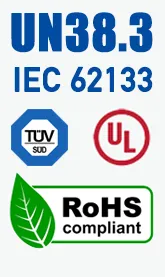
Will LiPo Battery Raw Materials Be Exhausted
LiPo batteries are now a ubiquitous part of our lives, powering everything from our smartphones to our electric vehicles. Yet, as demand for these batteries continues to grow, there are concerns that the raw materials used to make them could become scarce. In this article, we'll take a look at the raw materials used in lipo batteries, and whether or not they could be exhausted in the future. LiPo batteries are made up of three main components: the anode, the cathode, and the electrolyte. The anode is typically made of graphite, while the cathode is made of a metal oxide. The electrolyte is a lithium salt solution, which allows for the flow of lithium ions between the anode and cathode. The majority of lipo battery raw materials come from China. In fact, China produces more than 95% of the world's supply of lithium.
The main source of lithium is brine deposits, which are found in salty water lakes. China currently has the largest reserves of these brine deposits, followed by Chile, Argentina, and Bolivia. As demand for lipo batteries continues to grow, there are concerns that the world's supplies of lithium could be exhausted. However, it's worth noting that lithium is not a rare element, and it can be extracted from a variety of sources. In addition, there are a number of alternative materials that can be used in lipo batteries, such as sodium, magnesium, and aluminum. It's unlikely that lipo battery raw materials will be exhausted in the near future. However, as demand for these batteries grows, it's important to ensure that we have a sustainable supply of the raw materials used to make them.
LiPo batteries are one of the most popular types of rechargeable batteries on the market today, thanks to their high energy density and low weight. But with the rapid rise in the use of lipo batteries, there is a growing concern that the world's supply of lithium raw materials could be exhausted within a few decades. Lithium is a key component in lipo batteries, which are used in everything from laptops and cell phones to electric cars. The world's demand for lithium has grown rapidly in recent years, largely due to the rise in sales of electric vehicles. Tesla, the electric car manufacturer, is planning to produce 500,000 cars per year by 2020. This would require an estimated 32,000 metric tons of lithium annually, which is more than the world's current production of 29,000 metric tons. The majority of the world's lithium reserves are found in Chile, Argentina, and Bolivia, with smaller deposits in China, Australia, and the United States. Chile is the world's top producer of lithium, accounting for about a third of the world's supply. Argentina has the second-largest known lithium reserves in the world, and its production is growing rapidly. In 2015, Argentina produced about 5,000 metric tons of lithium, up from just 1,000 metric tons in 2014. Bolivia has the largest lithium reserves in the world, but its production is limited. In 2015, Bolivia produced just 2,000 metric tons of lithium. China is the world's largest consumer of lithium, but it produces very little of the metal itself. China imported about 70% of the lithium it used in 2015, mostly from Chile. Australia is the world's second-largest producer of lithium, accounting for about 17% of global production in 2015. The majority of Australia's lithium is mined in Western Australia. The United States has the third-largest known lithium reserves in the world, but it is a relatively small producer of the metal.
In 2015, the United States produced just 1,200 metric tons of lithium. As the demand for lithium continues to grow, there is a risk that the world's supply of lithium could be exhausted within a few decades. This would have significant implications for the electric vehicle industry, as well as for the many other industries that rely on lipo batteries.
